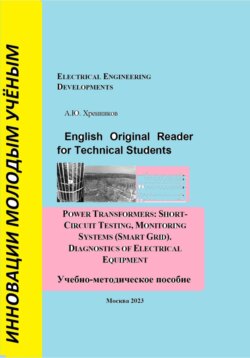Читать книгу English Original Reader for Technical Students. Power transformers: short-circuit testing, monitoring systems (Smart Grid) - Александр Юрьевич Хренников - Страница 11
Chapter 1. Monitoring Systems (Smart Grid) and Diagnostics Electrical Equipment Faults
1.8. Сalculation of Confidence of Interval of Measurement Random Error during Short-Circuit Transformer Testing
ОглавлениеIn the case of the appearance of residual deformations in the windings of transformer-reactor electrical equipment (TREE) comes a gradual increase in the value of short-circuit transformer inductance.
The criterion of the evaluation of the threshold quantity of the deviation of short-circuit inductance, which corresponds to the beginning of the appearance of deformation, is value (ΔХs-c = +0,2–0,3 % with the confidence interval (accuracy) of the measurements (Δconf = 0,1 %). Value ΔХs-c = +1 % corresponds to the sufficiently serious deformations of the transformer windings [by 1–4].
The given procedure of the determination of the confidence interval Δconf (1.12–1.25) for the measurements of Хs-c can be used also in the case of calculation Δconf for the deviations ΔХs-c in the course of transformer testing for withstand to short-circuit current. The value of Δconf for the deviations ΔХs-c, determined on (1.26), does not exceed the value of Δconf for ΔХs-c, since utilized in (1.13–1.15) Xaverageand X0 are calculated from the samples n of the uniform the equal-point values xi, which have one and the same law of random error distribution in the type “Chapeau”.
Let us illustrate this based on the example of a change in the significance of a deviation of short-circuit inductance ΔХs-c from one shot to the next during the 25MVA/220 kV transformer testing for withstand to short-circuit currents (Figure 6).
Figure 6. Example of a change in short-circuit inductance and the estimation of the significance of deviations Хs-c with the aid of the confidence interval of measurements Δconf during the 25MVA/220 kV transformer testing.
Advantage of the proposed in this chapter method one can see well in the case of changing Хs-c in the third, and then in the fourth final shot from +0,22 % to 0,34 %, when the value of confidence interval with the normal distribution Δconf = (no shaded rectangles in Figure 6) the significance of the obtained deviations does not give to estimate, since confidence intervals Δconf of third and fourth shots are overlapped. This can lead to the false conclusion that change ΔХs-c = +0,12 % from the third to the fourth shot insignificant and is connected only with the influence of measurement error.
The procedure of determination of Δconf, which presented in (1.13–1.26), allows to obtain the significant deviation of ΔХs-c with its change from the third short-circuit shot to the fourth short-circuit shot, having Δconf = 0,05 % for “Chapeau” distribution.
The obtained result is confirmed by the 25MVA/220 kV transformer dismantling at the manufacturing plant, when untwisting the regulating winding (RW) of transformer was discovered. Therefore, the proposed method is more reliable and can be recommending for the introduction on other short-circuit testing laboratories and in the operation in the power systems during the measurement of short-circuit inductance or impedance [by 3–4].
In addition to examined method, which makes it possible to obtain significant deviations of ΔХs-c with the aid of the correct calculation of Δconf, it follows to add that in the case of obtaining the insignificant deviations (as in Figure 6) from the first short-circuit shot to the second short-circuit shot and from second to the third short-circuit shot it is possible to consider significant deviation ΔХs-c = +0,17 % (0,22 % – 0,05 % = 0,17 %) from first to the third final short-circuit shot.
In addition to this, in the case of the intersection of the zones of confidence intervals Δconf between the first (ΔХs-c = +0,05 %) and the second short-circuit shot (ΔХs-c = +0,16 %) at point +0,11 % it is possible to consider this as one significant deviation ΔХs-c = +0,11 % with the confidence interval Δconf =, since between the second and the third short-circuit shot also occurs insignificant deviation (Figure 6) [by 10–14].
From Figure 5 follow that zones of confidence interval Δconf of measurement short-circuit inductance Хs-c of the adjacent on the time short-circuit shot (for example, 2-nd short-circuit shot and 3-d short-circuit shot) can intersect between themselves: ΔХs-c2 = +0,16 % (Δconf2 =) and ΔХs-c3 = +0,22 % (Δconf2 =).
This “imposition” of measurement confidence interval is inadmissible, since in certain cases this hampers the estimation of winding condition state of transformer: if this deviation ΔХs-c insignificantly, i.e. it is connected with a measurement error, then of changes in the windings does not occur; but if it significantly, i.e. it corresponds to the development of residual deformations in the windings, then it must be considered for evaluating the winding condition state in order not to bring it to the destruction [5–14].
Example. During the short-circuit testing of two accordingly switch reactors of the type ROST-700 in the course of measurements by ADC of short-circuit inductance there was identified “Chapeau” type distribution.
The value of resulting of measurement root-mean-square deviation comprised: = 0,02693 %; the value of the quantile coefficient t = 1,8143; the confidence interval of a measurement random error comprised Δconf = 0,052 % with the number of measurements of n = 572.
The obtained value Δconf = 0,052 % is lower than stipulated level of error +-0,1 %, which confirms the high accuracy of the determination of short-circuit inductance deviation in the proposed device – Smart Grid Monitoring System [by 1–9, 15–26].
